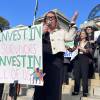Acting Mayor Kim Janey Thursday announced the withdrawal of a development proposal for the Downtown Waterfront from state consideration in order for it to be reassessed.
Under the plan, which first began to take shape in March 2013 under former Mayor Marty Walsh, the area that sits beside the Seaport and runs parallel to the Rose Kennedy Greenway was slated to receive new buildings. The plan includes one building as tall as 600 feet at the existing Harbor Garage site near the New England Aquarium, proposed by developer Don Chiofaro, and one as tall as 305 feet at the James Hook Lobster Company along Atlantic Ave.
The proposal, formally the Downtown Waterfront District Municipal Harbor Plan, included city-level approvals to develop the 42-acre area but needed the state’s Department of Environmental Protection's blessing to move forward.
Janey, who is running for a full term as mayor, said Walsh's plan did not do enough to foster climate resilience or provide equitable waterfront access. She said that she will assemble a task force to re-study the matter.
"I understand the challenges of reassessing our plans for the city's waterfront, and I am sympathetic to them," said Janey. "But we have to act with urgency if we are serious about addressing this moment and fulfilling our obligations in a way that reflects our values and protects future generations."
Janey's withdrawal of the proposal could scrap nearly a decade of negotiations and planning, complicated by lawsuits and a reported feud between former Mayor Tom Menino and developer Chiofaro.
Earlier this year, a Suffolk County judge ruled the Department of Environmental Protection acted improperly by punting approval of the plan to the Secretary for Energy and Environmental Affairs.
The lawsuit was brought by the Conservation Law Foundation, which celebrated Janey's decision. The group hopes to work with the city to put climate resilience and equity at the forefront of future plans, said Deanna Moran, CLF's Director of Environmental Planning.
"The waterfront really is — legally — supposed to be a resource for everyone's enjoyment," Moran told GBH News. "The last time around, [developers] really drove the conversation because they came to the table with, you know, pretty much a fully baked idea of what they wanted to do.
"That's why we have a plan that's focused on two individual parcels over a 42 acre-wide district," she said. "I don't want to see this redo be focused on responding to, or tweaking, the existing proposals. I think we really need to take a step back and take this opportunity to think outside the box — and think about what else is possible."
But NAIOP Massachusetts, the Commercial Real Estate Development Association, was "surprised" and "disappointed" to see the decision, said CEO Tamara Small. She said the move creates "tremendous uncertainty" for developers.
"If you have a municipal harbor plan that's gone through the process, gone through years of public and the review, and then suddenly you have a mayor who decides — at this point in the process — to overturn it, that really eliminates predictability and certainty for the development industry," Small said. "What is it saying for development in the City of Boston? If the municipal harbor plan can be overturned, then what else could be overturned?"
Janey said her re-evaluation will not necessarily exclude Chiofaro, who proposed the tallest building within the plan. "Will that become part of it? We shall see," she said.
A Chiofaro Company spokesperson said that it continues to be committed to the investment, as well as the neighborhood and city.
"The urgency for action is undeniable," Magnolia Dow said in a statement. "We welcome conversations with all who are interested in cooperating on a viable path to a more resilient, equitable, accessible and economically vibrant Downtown Waterfront."
Asked about how equity applies to the waterfront, Janey said the city needs to ensure that it is mitigating the effects of climate change and "creating more access" within the Downtown Waterfront area, as well as within other neighborhoods that border Boston's waterways like Charlestown, Dorchester, East Boston, the North End and South Boston.
Kathy Abbott, CEO of Boston Harbor Now, echoed Janey's call for equity in waterfront access.
"Real estate development around the harbor has just been booming," she said in an interview with GBH News, adding "it doesn't look and feel very welcoming" to some communities.
"It's about making sure that everybody in the City of Boston feels welcomed to come down to the waterfront," and that the waterfront benefits as many people as possible, she said.
Abbott said it's "possible but hard" for equity and luxury to co-exist in the waterfront areas, but it would require developers, the public sector and neighborhood involvement to create acceptable plans.
An administration official said Janey's withdrawal would be finalized when the state accepts her withdrawal request letter, which she sent Thursday.
The public affairs office of the Massachusetts' Department of Environmental Protection, did not respond to GBH News calls for comment.
Janey announced the city hall reversal at a press conference. When questioned by a reporter whether her action might exceed her authority as acting mayor, Janey replied, "I just did it."
GBH News’ Mark Herz contributed reporting.








